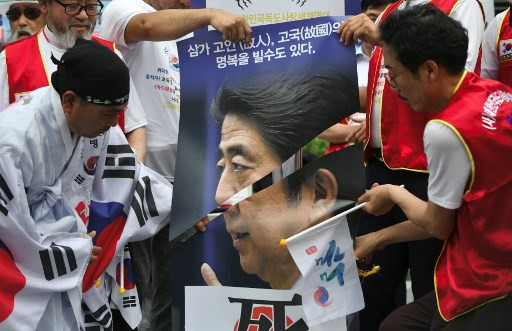Popular Reads
Top Results
Can't find what you're looking for?
View all search resultsPopular Reads
Top Results
Can't find what you're looking for?
View all search resultsSouth Korea court orders Japan to compensate former "comfort women"
The ruling is certain to further fray the already strained ties between the two countries over wartime labor compensation and other issues.
Change text size
Gift Premium Articles
to Anyone
 This file photo taken on July 23, 2019 shows South Korean protestors cutting a banner with a picture of Japan's Prime Minister Shinzo Abe during a rally denouncing Japan for its recent trade restrictions against Seoul over wartime slavery disputes, near the Japanese embassy in Seoul. A visceral trade row between Japan and South Korea risks damaging both countries' national interests as their leaders seek to bolster domestic political positions, analysts say.
(AFP/Jung Yeon-je)
This file photo taken on July 23, 2019 shows South Korean protestors cutting a banner with a picture of Japan's Prime Minister Shinzo Abe during a rally denouncing Japan for its recent trade restrictions against Seoul over wartime slavery disputes, near the Japanese embassy in Seoul. A visceral trade row between Japan and South Korea risks damaging both countries' national interests as their leaders seek to bolster domestic political positions, analysts say.
(AFP/Jung Yeon-je)
A
South Korean court ordered the Japanese government on Friday to pay damages to a group of former "comfort women" over their treatment at Japanese military brothels during World War II, marking the first such court ruling in South Korea.
The ruling is certain to further fray the already strained ties between the two countries over wartime labor compensation and other issues.
In awarding the 12 plaintiffs 100 million won ($92,000) each as demanded, the Seoul Central District Court said sovereign immunity -- a concept under international law that the state is immune from the jurisdiction of the court of a foreign country -- cannot be applied to the case.
The Japanese government has taken the position that the lawsuit should be dismissed on that ground and declined to be involved in the suit.
In rejecting the application of sovereign immunity to the case, the court said it can be judged that the government "violated international norms by committing intentional, systematic and wide-ranging inhumane criminal acts."
The plaintiffs claimed the manner in which they were compelled to work as comfort women, and treated while they did so, amounted to an "inhumane criminal act," and demanded the court not adopt sovereign immunity for their case.
The plaintiffs consist of both living and dead including Lee Ok Son who is in her 90s and lives with other women at the "House of Sharing," a group home on the outskirts of Seoul for Korean women who were forced into wartime brothels.
In August 2013, the women filed for court mediation seeking 100 million won each in damages from the Japanese government. But after Japan refused to accept the mediation, the case proceeded to a formal trial.
With Japan refusing to accept relevant documents, the court considered papers served through a process known as public notification, and proceeded with the case.
A ruling on a similar case is scheduled at the Seoul court on Wednesday. In that suit, 20 plaintiffs including the bereaved families of some former comfort women are seeking a total of 3 billion won from the Japanese government.
The issue of comfort women has long been a source of tension between Japan and South Korea, and the two countries struck a deal in December 2015 to "finally and irreversibly" resolve the dispute.
Using the 1 billion yen ($9.68 million) provided by the Japanese government as part of the deal, cash was distributed to former comfort women and the families of those who had died. But some women refused to accept it, calling instead for an official apology and compensation from Japan.
Japan and South Korea have also been locked in a dispute stemming from 2018 South Korean Supreme Court rulings that ordered Japanese companies to compensate South Koreans for forced labor during Japan's 1910-1945 colonial rule over the Korean Peninsula.
The dispute could worsen bilateral ties, which are already at a historic low, with court proceedings under way in South Korea to possibly liquidate Japanese firms' assets to compensate the plaintiffs.
Japan says all claims related to its colonial rule were settled by a 1965 bilateral agreement under which it provided financial aid to Seoul on the understanding that the issue of compensation was resolved "completely and finally."









